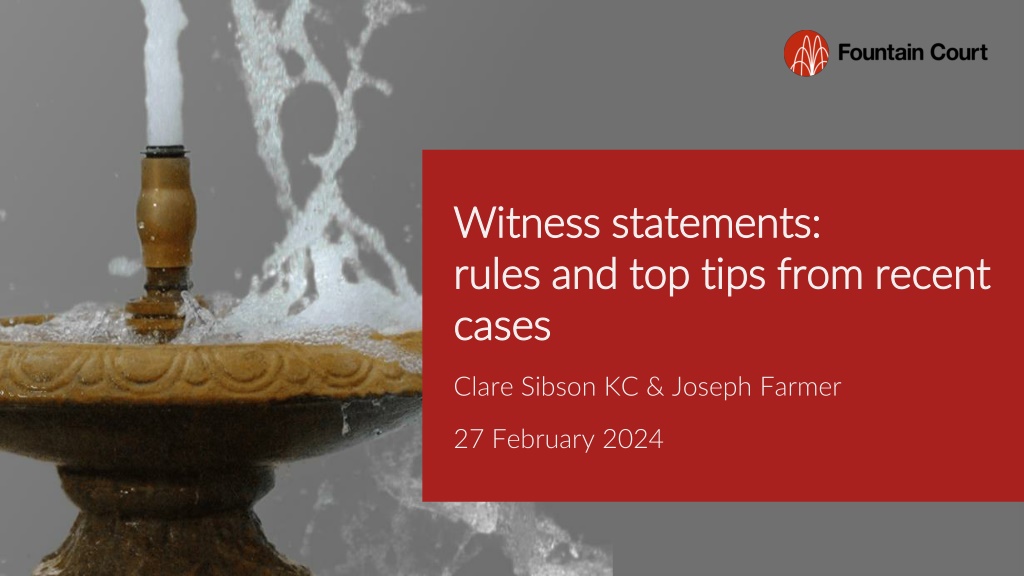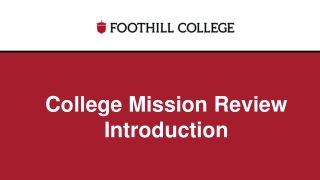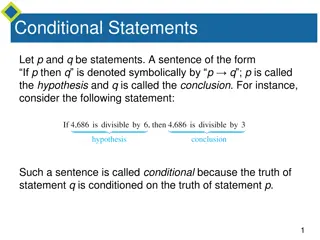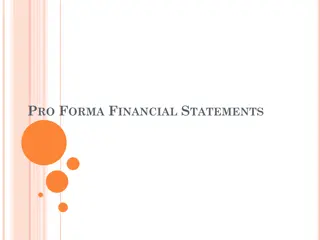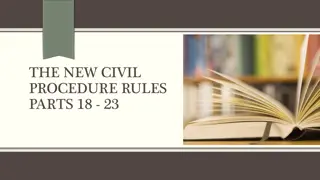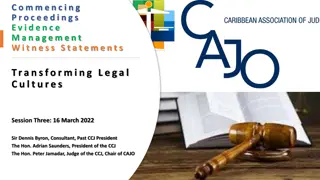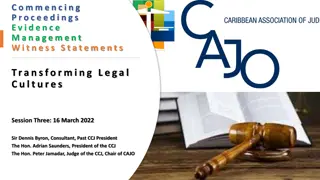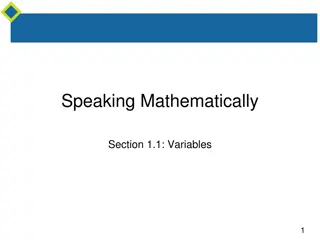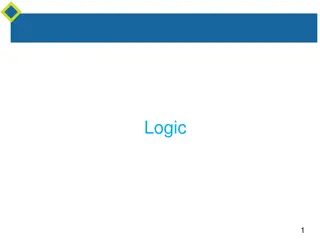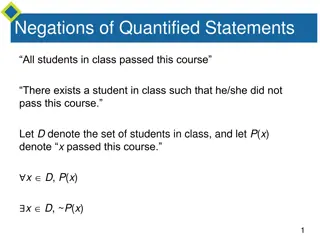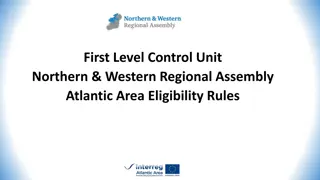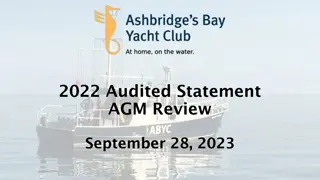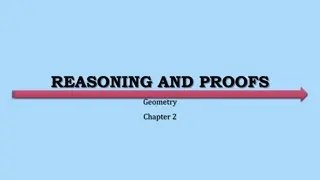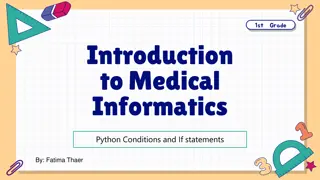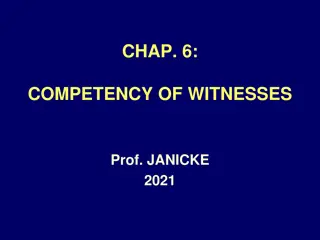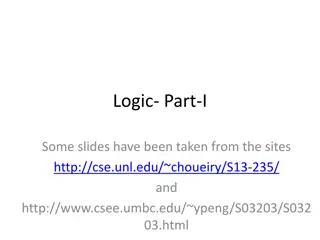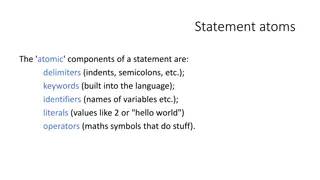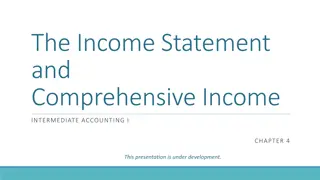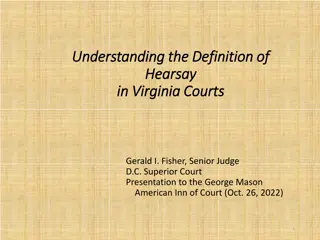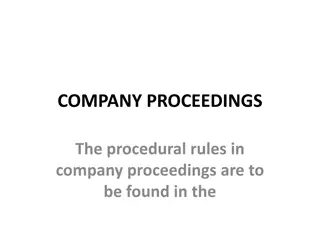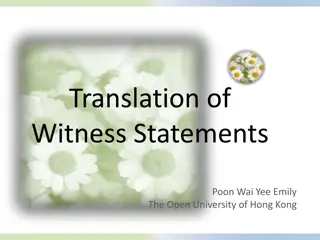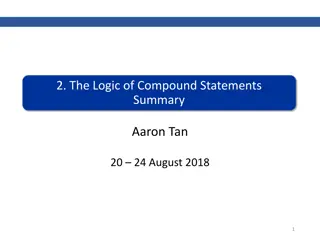Understanding Witness Statements: Rules and Best Practices
Witness statements play a crucial role in legal proceedings, and it's essential to grasp the rules governing human memory, the scope of witness evidence, and the content required in such statements. Human memory is dynamic and susceptible to influences, emphasizing the need for accurate and reliable witness accounts. Not all matters necessitate witness evidence, as some facts are self-explanatory or adequately conveyed through documents. Witness statements should focus on factual information with personal knowledge relevant to the case. Additionally, witnesses can provide testimony on statements made to them and hypothetical scenarios based on altered facts.
Download Presentation

Please find below an Image/Link to download the presentation.
The content on the website is provided AS IS for your information and personal use only. It may not be sold, licensed, or shared on other websites without obtaining consent from the author. Download presentation by click this link. If you encounter any issues during the download, it is possible that the publisher has removed the file from their server.
E N D
Presentation Transcript
Witness statements: Witness statements: rules and top tips from recent rules and top tips from recent cases cases Clare Sibson KC & Joseph Farmer 27 February 2024
Witness evidence human memory Witnesses of fact and those assisting them to provide a trial witness statement should understand that when assessing witness evidence the approach of the court is that human memory: (1) is not a simple mental record of a witnessed event that is fixed at the time of the experience and fades over time, but (2) is a fluid and malleable state of perception concerning an individual s past experiences, and therefore (3) is vulnerable to being altered by a range of influences, such that the individual may or may not be conscious of the alteration (Statement of Best Practice, 1.3)
Witness evidencescope Many matters of fact do not require witness evidence, either because they are common ground or because witness testimony adds nothing of substance to the disclosed documents. The fact that there is or may be an issue concerning what the disclosed documents mean or show does not, without more, mean that witness evidence is required (SBP, 2.2).
Witness statements content Basic rule: The purpose of a trial witness statement is to set out writing the evidence in chief that a witness of fact would give if they were allowed to give oral evidence at trial without having provided the statement(PD, 2.1). Truism not limited to the [Business and Property Courts] : Nieman v Withers LLP [2022] EWHC 2237 (QB) at [124] (Andrew Baker J) o Elaboration: The witness statement should contain evidence as to matters of fact that need to be proved at trial by witness evidence, and the evidence as to such matters that the witness would be asked and be allowed to give orally in chief at the trial (PD 3.1; SBP, 2.1). Further elaboration: It should only set out matters of fact of which the witness has personal knowledge (including their recollection of matters they witnessed personally) that are relevant to the case (PD, 3.1; SBP, 2.3). matter witnessed personally = experienced by one of the primary senses or internal to the mind (for example, what witness thought about something at some time in the past or why they took some past decision or action)
Witness statementscontent May include evidence of things said to a witness, since the witness can testify to the statement made to them, if (a) the fact that the statement was made to the witness is itself relevant to an issue to be determined at trial or (b) the truth of what was said to the witness is relevant to such an issue and the statement made to the witness is to be relied on as hearsay evidence (SBP, 2.3) Witness may give evidence as to what they would or would not have done or thought if the facts, or their understanding of them, had been different (SBP, 2.4).
Witness statements whose words? Witness statement should be in the witness s own words (PD, 3.3). A trial witness statement must comply with paragraphs 18.1 and 18.2 of Practice Direction 32, ... (Paragraph 18.1 of Practice Direction 32 requires a trial witness statement to be in the witness s own words, if practicable, and to be drafted in the witness s own language and in the first person; paragraphs 18.1(1) to (5) and 18.2 set out further requirements; paragraph 23 of Practice Direction 32 provides that a party who relies on a witness statement in a foreign language must also file a translation.) MF Tel Sarl v Visa Europe Limited [2023] EWHC 1336 (Ch) at [8] compliance with PD 32, para 18.2
Witness statementsdocuments The statement should refer to documents, if at all, only where necessary. It will generally not be necessary for a trial witness statement to refer to documents beyond providing a list to comply with PD, 3.2, unless PD, 3.7 applies [i.e. that the witness should state whether/how/when his recollection has been refreshed by reference to documents, identifying those documents] or the witness s evidence is required to: prove or disprove the content, date or authenticity of the document; explain that the witness understood a document, or particular words or phrases, in a certain way when sending, receiving or otherwise encountering a document in the past; or confirm that the witness saw or did not see the document at the relevant time; but in the case of the three bullets above if (and only if) such evidence is relevant (SBP, 3.4).
Witness statementsdocuments Where a trial witness statement does refer to a document, it should not exhibit the document but should give a reference enabling it to be identified by the parties, unless it is a document being produced or disclosed by the witness that has not been disclosed in the proceedings (SBP, 3.4). Cf Lifestyle Equities C.V. v Royal County of Berkshire Polo Club Ltd [2023] FSR 22 at [106]-[107].
Witness statementsdocuments In terms of SBP, 3.6, the statement should not: quote at any length from any document to which reference is made, seek to argue the case, either generally or on particular points, take the court through the documents in the case or set out a narrative of or derived from documents, or include commentary on other evidence in the case (either documents or the evidence of other witnesses), i.e. set out matters of belief, opinion or argument about the meaning, effect, relevance or significance of that other evidence (save as set out at SBP, 3.4).
Witness statementsdocuments The PD is not intended to prevent a witness from giving evidence of his or her own experiences or what he or she had seen or heard, done or said, even where there was a document before the court which recorded the same thing: Primavera Associates v Hertsmere BC [2022] EWHC 1240 (Ch) at [29]. Witness statement should be based on the recollections, albeit refreshed by documents, rather than a reconstruction of events by reference to documents: JD Classics Ltd (In Administration) v Hood [2021] EWHC 3193 (Comm) at [154].
Witness statementsrecollection On important disputed matters of fact, the statement should, if practicable: state in the witness s own words how well they recall the matters addressed; and state whether, and if so how and when, the witness s recollection in relation to those matters has been refreshed by reference to documents, identifying those documents (SBP, 3.7). Blue Manchester Limited v Bug-Alu Technic GmbH [2021] EWHC 3095 (TCC): sufficient for the witness to have explained that the contents of his witness statement were all based on a combination of his personal recollection of events, stating in general terms how well he recalled events overall, together with a re-reading of the contemporaneous documents: [30] and [31].
Witness statementspractical tips Witness statements should be prepared in accordance with the Statement of Best Practice and any relevant court guide (PD, 3.4) Avoid as far as possible any practice that might alter or influence the recollection of the witness other than by refreshment of memory (SBP, 3.2) Explain to witness the purpose and proper content of statement and proper practice in its preparation before any draft statement and, wherever practicable, before any evidence is obtained from them. Includes ensuring that the witness has read, or reading to the witness, the witness confirmation in PD 4.1 (SBP, 3.9) Ask open questions (SBP, 3.10, 3.11) Take a contemporaneous note of the answers (SBP, 3.10, 3.11) Use that note to draft the statement don t go beyond it. If you need more information or evidence, get it by asking non-leading questions. Don t propose content (SBP, 3.13) Legal representative should assist the witness as to structure, layout and scope and may take primary responsibility for drafting it (SBP, 3.13) Should involve as few drafts as is practicable because [a]ny process of repeatedly revisiting a draft statement may corrupt rather than improve recollection (SBP, 3.8)
Witness statementsdocuments (again) Statement must identify by list what documents, if any, the witness has referred to or been referred to for the purpose of providing the evidence set out in their trial witness statement (PD, 3.2). Purpose of this rule : Mansion Place Limited v Fox Industrial Services Limited [2021] EWHC 2747 (TCC) at [59]; Anan Kasei Co Ltd v Neo Chemicals & Oxides (Europe) Ltd [2022] EWHC 708 (Ch) [13]. During evidence in chief given otherwise than by witness statement, the witness s memory may be refreshed by being shown a document, but only if the witness created or saw the document while the facts evidenced by or referred to in the document were still fresh in their mind, so that they would have known if they were accurate or inaccurate (SBP, 2.6). Particular caution should be exercised before or when showing a witness any document they did not create or see while the facts evidenced by or referred to in the document were fresh in their mind (SBP, 3.4).
Non-compliance sanctions Without limiting the Court s powers of case management and sanction, the PD refers to the following actions the Court may take in the event of non- compliance: refuse to give or withdraw permission to rely on, or strike out, part or all of a trial witness statement, order that a trial witness statement be re-drafted in accordance with this Practice Direction or as may be directed by the court, make an adverse costs order against the non-complying party, and order a witness to give some or all of their evidence in chief orally (PD, 5.2).
Non-compliance partiesapproach No hard and fast rules: exercise common sense and sound judgment, having regard to the seriousness of the breach and to the importance of proportionality : Curtis v Zurich [2022] EWHC 1749 at [5]. PD not to be taken as an encouragement to go through witness statements with a fine-tooth comb for the purpose of identifying as many instances of compliance as possible for use in trench warfare PD should not be taken as a weapon with which to fillet from a witness statement either two or three words at various points or essentially insignificant failures to comply with [the PD] in a witness statement : Lifestyle Equities [2022] F.S.R. 22 at [98]. In the majority of cases it ought to be reasonably easy to decide whether or not there has been a breach that is more than merely trivial: Blue Manchester [23]. Raise concerns with other side in a sensible and proportionate way: Mansion Place [49]. Parties should attempt to reach agreement on revised versions of witness statements: Prime London Holdings 11 Limited v Thurloe Lodge Limited [2022] EWHC 79 (Ch) at [36]. If that s not possible, parties should seek assistance of the Court. But they should do so in a sensible and proportionate way: no disruption to trial or unnecessary costs; no satellite litigation: Mansion Place [49]. Applications to deal with non-compliance should not be used as litigation weapons : Curtis [5].
Noncompliance Courts approach In some cases, sensible and proportionate to deal with compliance at trial. Often trial judge is best placed to determine issues that relate to admissibility has a view of case and evidence as a whole. Vainker v Marbank [2022] EWHC 2785 (TCC) at [4], [5], [18]-[22]. The trial judge can simply disregard the non-compliant parts of the statement/take a view on the extent to which the non- compliance affects credibility, reliability or weight. e.g. Anan Kasei at [16]; Bahia v Sidhu [2022] EWHC 875 (Ch) at [46]; Lifestyle Equities [56], [92]; Brendon International Limited v Water Plus Limited and ors [2022] EWHC 3321 (Ch) at [80]-[81] Credibility: Spencer v Spencer [2023] EWHC 2050 (Ch); Thomas Barnes & Sons Plc (in Administration) v Blackburn with Darwen Borough Council [2022] EWHC 2598 at [22]-[23]. In some cases, it will be sensible or necessary to do so in advance of trial perhaps at a hearing, perhaps on the papers. Greencastle MM LLP v Payne [2022] EWHC 438 (IPEC) serious failures, but time before trial to sort them out; permission given to serve replacement statements: [122]. Court should be realistic about what is required; compliance with PD should not be onerous, so long as the witness statement is produced from the outset with the fundamental requirements well in mind. This is consistent with the Court tolerating some trivial non-compliance: Blue Manchester [11] and [36], [45]; as to trivial non-compliance, see Primavera [34]. [t]he process needs to be speedy and cost-effective judges should resist becoming embroiled in the minutiae of these complaints save where unavoidable : Blue Manchester [43].
Noncompliance strike out Very significant sanction reserved for the most serious cases / where there is a substantial breach of the PD: Blue Manchester [44]; Prime London Holdings [40]. Before an application is brought, consider whether it is necessary and proportionate: Lifestyle Equities [98]. Court will be astute to strike out parts of a statement which are non-compliant, but it will not do so where it is not reasonably necessary: Blue Manchester [11].
Noncompliance relief from sanction? Probably not necessary to apply for relief from sanction, at least in circumstances where it is not envisaged that the Court will withdraw permission for the original statement. Prime London Holdings [24]; Greencastle [32]; L&T Electrical & Automation Fze v Synetic Systems Group Limited [2022] EWHC 819 (TCC) at [28]. Cf. Shill Properties Limited v Bunch [2023] EWHC 478 (Ch) at [35]-[38] (original statements filed late; revised statements also filed). The Court has on several occasions simply ordered the replacement of an original witness statement with a compliant one, or ordered redactions: Blue Manchester [44]-[46]; Mansion Place [51]ff; Prime London Holdings [41]; Greencastle [35]; McKinney Plant & Safety Ltd v The Construction Industry Training Board [2022] EWHC 2361 (Ch) at [17].
Noncompliance costs it is to be hoped that as PD57AC becomes more familiar to practitioners and as the principles become clearer such heavily contested, time-consuming and expensive applications become the exception rather than the norm. Parties in Business and Property Court cases who indulge in unnecessary trench warfare in such cases can expect to be criticised and penalised in costs : Blue Manchester [10]. Curtiss v Zurich [2022] EWHC 1514 (TCC) indemnity costs against applicant. McKinney Plant & Safety indemnity costs against respondent. Lloyds Developments Limited v Accor Hotel Services UK Limited [2022] EWHC 3698 (TCC) at [35] costs of producing witness statements.
London Singapore Fountain Court Chambers Fountain Court, Temple, London, EC4Y 9DH T +44 (0)20 7583 3335 Fountain Court Chambers 10 Collyer Quay, Ocean Financial Centre #40-38, Singapore 049315 T 65 6808 6611 www.fountaincourt.co.uk
